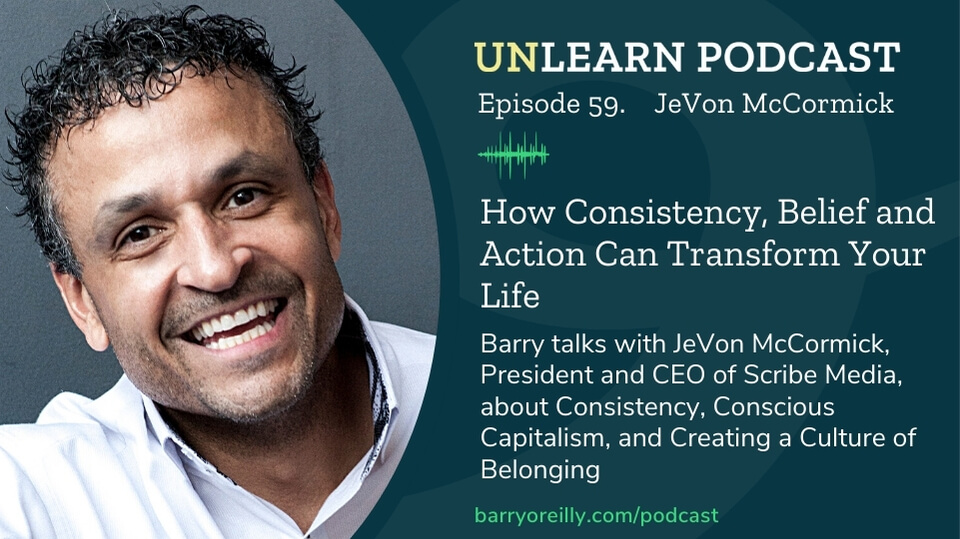“If there’s one thing we love on this show,” Barry O’Reilly tells this week’s guest, “is people just speaking from their heart and what really matters and what they believe in; and I can’t think of anyone who better exemplifies that than you.” JeVon McCormick’s story is certainly a testament to the value of believing in yourself and taking consistent action despite the odds. JeVon persevered through every setback and maintained consistency, vowing to never stop until he achieved his goals. He and Barry talk about his inspirational journey and how to stay consistent even when the decks are stacked against you.
Possibility Opens Your Eyes
You can only aspire to what you see and know is possible, JeVon tells Barry. He shares that a drive through an affluent community as a child was the beginning of his mindset shift. “It showed me possibility, and that was very key,” he comments. A big problem in lower economic communities is that many people there don’t know all the options that exist. “When I was shown possibility, that was game-changing for me; even though I didn’t know how I was going to get there, it showed me possibility, and it was up to me to go figure out [how to] make that happen,” he says. [Listen from 2:00]

Consistency and Action
In a society of instant gratification, the importance of consistency is often downplayed. However, JeVon tells Barry, what helped him improve his circumstances and his life overall was his commitment to never stop trying. “The biggest thing was I was always consistent,” he remarks. He kept learning from his mistakes and improving on his strengths. He posits, “I truly believe you only fail if you stop trying.” Barry adds that society rarely talks about the hard part of consistency: getting back up after getting knocked down, or holding on when it seems more sensible to let go. “What are some of the things that help you keep moving forward?” Barry asks. Jevon responds that his childhood experience of hunger and having to steal to feed his younger siblings puts the stress of business into proper perspective. However, he looks to how other people triumph over their daily struggles for his inspiration. “You’re drawing strength from the power of those people, their spirit, their willingness,” Barry commends him. “And I think it’s a great way to step back and be grateful for what you have got and achieved, but also not sit on your laurels.” [Listen from 8:35]
(Read the blog about Moving at the Speed of Trust)
How Conscious Capitalism Can Change Lives
Barry sees JeVon’s work in conscious capitalism as a great juncture of his ethics, mindset, and entrepreneurialism. He asks him what inspired him to get involved in the space. Society demonizes capitalism, JeVon replies, but it has tremendous power to change lives: “Capitalism has provided me with the life that I have right now, and I truly believe that if more people from the lower economic communities that I come from knew the power of capitalism, that it could also change their lives.” Conscious capitalism is about taking capitalism to the communities where it can really make a positive impact. He shares an example about how retailers like Whole Foods could help change generational poverty by opening stores in lower income neighborhoods. More than just creating jobs in these communities, they would be creating possibility, so younger generations would now have more to aspire to. Barry cites Charles Marohn’s book, Strong Towns, to illustrate the importance of intentionally designing equitable communities. “People are educated because it’s in front of them,” he points out. He also comments on Kevin Hart’s mission to educate lower income communities about wealth creation, and Nobody Studio’s mandate to make investment opportunities accessible to all. We all have to play our part, both men agree, otherwise the system will not change. “There is nothing wrong with being extremely profitable in my opinion,” JeVon continues, “as long as you’re doing right by the people that you serve and doing right by the communities in which you serve.” [Listen from 22:20]
(Listen to the previous podcast about The Future of Venture Company Creation with Mark S. McNally)
Looking Ahead
JeVon is excited about doing his part in making a racially just society. He explains why he now goes by JeVon instead of JT. “I made the decision for every kid named RayVontae, Martavias, Lawanda, Lacresha; and I did it with the intent – in the belief – that one day when they hit corporate America, that maybe they can work next to a JeVon and not just a JT.” He’s about creating real, tangible change: not just attracting diverse persons, but creating a culture of belonging so everyone feels welcome and respected in the workplace. Barry comments that we have to call out inequality, talk about it, so we can start the change. [Listen from 33:55]















